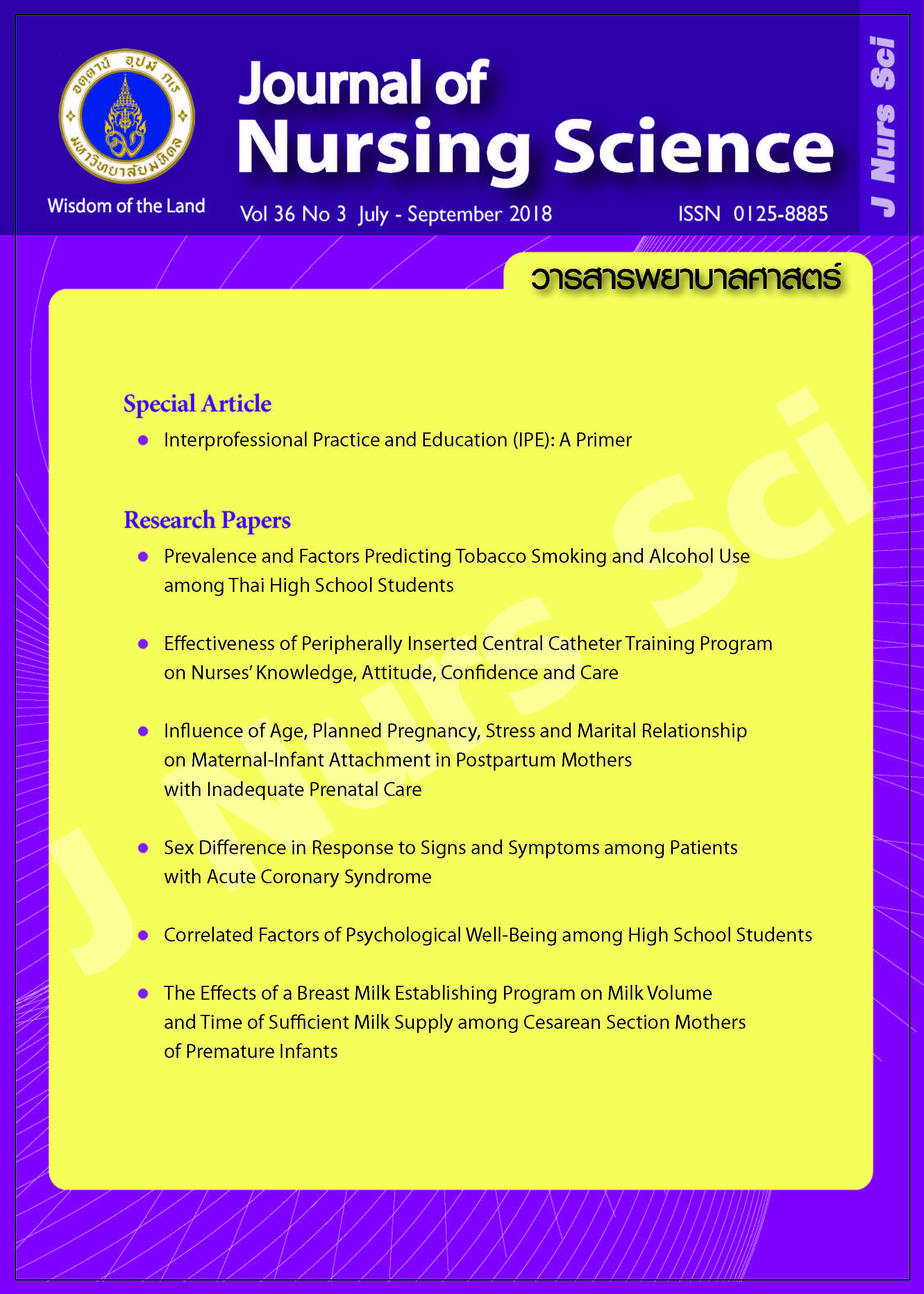Correlated Factors of Psychological Well-Being among High School Students
Main Article Content
Abstract
Purpose: To identify the psychological well-being and the relationship between personal factors: age, sex, GPA, sufficient income, satisfaction of income and psychological well-being of secondary school students.
Design: Correlational study design.
Methods: The 624 high school students were sampling from schools in Bangkok and Nakorn Pathom province, Thailand. The research instruments including personal information and 18-item Psychological Well-being Scale. Data analyses involved descriptive statistics and Pearson correlation.
Main Findings: The high school students reported moderate level of psychological well-being ( = 73.18, SD = 9.05). Autonomy revealed the lowest mean score (
= 11.31, SD = 1.96) and personal growth revealed the highest mean score (
= 13.73, SD = 2.34). Age, GPA, satisfaction of income, sufficient income were significantly correlated with psychological well-being at significance level of .05.
Conclusion and recommendations: The findings of this study indicated that the psychological well-being of the secondary school students was in moderate level. Age, GPA, satisfaction with income, and sufficient income were correlated with psychological well-being. These findings could use as the basic knowledge to provide the mental health promotion for psychological well-being of adolescents in secondary school with the concern of their demographic factors. In addition, the
findings also provide the fundamental knowledge for further research to promote psychological well-being in adolescent.
Article Details
Copyright Notice: Nursing Science Journal of Thailand has exclusive rights to publish and distribute the manuscript and all contents therein. Without the journal’s permission, the dissemination of the manuscript in another journal or online, and the reproduction of the manuscript for non-educational purpose are prohibited.

Disclaimer: The opinion expressed and figures provided in this journal, NSJT, are the sole responsibility of the authors. The editorial board bears no responsibility in this regard.
References
2. Thanoi W, Phancharoenworakul K, Thompson E, Panitrat R, Nityasuddhi D. Thai adolescent suicide risk behaviors: testing a model of negative life events, rumination, emotional distress, resilience and social support. Pacific Rim International Journal of Nursing Research. 2010;14(3):187-202.
3. Ang RP, Huan VS. Relationship between academic stress and suicidal ideation: testing for depression as a mediator using multiple regression. Child Psychiatry Hum Dev. 2006;37(2):133-43.
4. Cole DA. Preliminary support for a competency-based model of depression in children. J Abnorm Psychol. 1991;100(2):181-90.
5. Kraag G, Zeegers MP, Kok G, Hosman C, Abu-Saad HH. School programs targeting stress management in children and adolescents: a meta-analysis. J Sch Psychol. 2006;44(6):449-72.
6. Roberts RE, Roberts CR, Xing Y. Restricted sleep among adolescents: prevalence, incidence, persistence, and associated factors. Behav Sleep Med. 2011;9(1):18-30.
7. Vongsirimas N, Sitthimongkol Y, Beeber SL, Wiratchai N, Sangon S. Relationship among
maternal depressive symptoms, gender differences and depressive symptoms in Thai adolescents. Thai Journal of Nursing Counsil. 2009;13(3):181-98.
8. Thanoi W, Pornchaikate Au-Yeong A, Ondee P. Factors affecting the mental health of the faculty of nursing students, Mahidol University. Thai Journal of Nursing Council. 2012;27 Suppl:60-76. (in Thai).
9. Sukhawaha S, Arunpongpaisal S, Rungreangkulkij S. Attempted suicide triggers in Thai adolescent perspectives. Arch Psychiatr Nurs. 2016;30(3):334-41.
10. Ryan RM, Deci EL. On happiness and human potentials: a review of research on hedonic and eudemonic well-being. Annu Rev Psychol. 2001;52:141-66.
11. Ryff CD. Happiness is everything, or is it? Explorations on the meaning of psychological well-being. J Pers Soc Psychol. 1989;57(6):1069-81.
12. Diener E. Subjective well-being. Psychol Bull. 1984;95(3):542-75.
13. Marsh HW, Craven RG. Reciprocal effects of self-concept and performance from a multidimensional perspective: beyond seductive pleasure and unidimensional perspectives. Perspect Psychol Sci. 2006;1(2):133-63.
14. Subprawong K. Mediating role of selfconcept in studying effects of positive thinking and students’ backgrounds on psychological well-being. Journal of Research Methodology. 2015;28(1):49-73. (in Thai).
15. Rapheal J, Paul KV. Psychological wellbeing and anxiety among adolescents analysis along wellness: illness continuum. International Journal of Innovative Research & Development. 2014;3(1):395-401.
16. Anand K, Nagle YK. Perceived stress as predictor of psychological well-being among Indian youth. The International Journal of Indian Psychology. 2016;3(4):211-17.
17. Perez JA. Gender difference in psychological well-being among Filipino college student samples. Int J Humanit Soc Sci. 2012;2(13):84-93.
18. Seymour N. Psychological well-being in adolescents: planning towards and thinking about the future [dissertation]. London: Royal Holloway, University of London; 2015. 222 p.
19. Gibbon C, Dempster M, Moutray M. Stress, coping and satisfaction in nursing students. J Adv Nurs. 2010;67(3):621-32.
20. Khan Y, Taghdisi HM, Nourijelyani, K. Psychological Well-Being (PWB) of school adolescents aged 12-18 yr, its correlation with general levels of Physical Activity (PA) and socio-demographic factors in Gilgit, Pakistan. Iran J Public Health. 2015;44(6):804-13.
21. Jovic-Vranes A, Jankovic J, Vasic V, Jankovic S. Self-perceived health and psychological well-being among Serbian schoolchildren and adolescents: data from National Health Survey.
Open Med-Warsaw. 2011;6(4):400-6.
22. Bakare OA. Socio-demographic variables as predictors of psychological well-being amongst the adolescents with hearing impairment in Southwest Nigeria. IFE PsychologI. 2013;21(1):245-59.
23. Dangi S, Nagle YK, Personality factors as determinants of psychological well-being among adolescents. Indian Journal of Health and Wellbeing. 2015;6(4):369-73.
24. Springer KW, Pudrovska T, Hauser RM. Does psychological well-being change with age?:
longitudinal tests of age variations and further exploration of the multidimensionality of Ryff’s model of psychological well-being. Soc Sci Res. 2011;40(1):392–8.
25. Ryff CD, Keyes CL. The structure of psychological well-being revisited. J Pers Soc Psychol. 1995;69(4):719-27.


